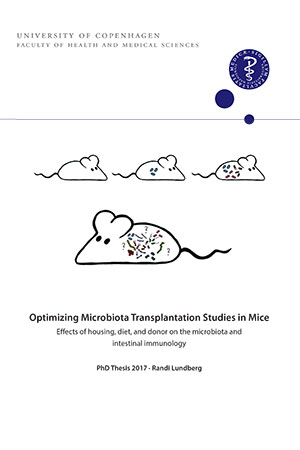 Three years ago, Taconic Biosciences and the University of Copenhagen came together to sponsor an Industrial PhD student through a program supported by Innovation Fund Denmark (IFD). IFD invests in new knowledge and technology creating growth and employment in Denmark.
Three years ago, Taconic Biosciences and the University of Copenhagen came together to sponsor an Industrial PhD student through a program supported by Innovation Fund Denmark (IFD). IFD invests in new knowledge and technology creating growth and employment in Denmark.
The Industrial PhD Program
The Industrial PhD program provides opportunities to students that might not otherwise be available in a traditional PhD program. Applicants accepted into the program participate in a traditional, academic PhD program, but with additional elements drawn from thriving cooperative education programs. They are paired with a partner in the bioscience industry; academic and corporate supervisors participate equally in assisting the student's successful navigation of the PhD program.Professor Axel Kornerup Hansen, head of section of Biomedicine in the department of Veterinary and Animal Sciences at the University of Copenhagen, served as academic supervisor throughout the program. Professor Hansen's research focus is on how the microbiota impacts laboratory animal models for inflammatory diseases and how this works in conjunction with the diet.
With Taconic's interest in providing high quality mouse models for microbiome studies, the partnership could support an Industrial PhD student who wanted to focus research on the microbiome and laboratory mice.
Participant Spotlight: Randi Lundberg
– Dr. Lundberg
Dr. Lundberg's work improved the understanding of how to conduct fecal microbiota transplant studies in mice. With little standardization, many scientists conducting fecal microbiota studies have been subject to trial and error when conducting their studies. Dr. Lundberg's research goes a long way to setting standards in conducting these studies.
Publications
Dr. Lundberg published two papers and an FMT white paper reflecting the research conducted while she was a PhD student.- The first publication, Antibiotic-treated versus germ-free rodents for microbiota transplantation studies1, helps researchers understand which model is best used depending on the aim of their research.
- In the second manuscript, Microbiota composition of simultaneously colonized mice housed under either gnotobiotic isolator or individually ventilated cage regime2, Dr. Lundberg reports on key findings in a fecal microbiota transplantation (FMT) studies using a traditional gnotobiotic technique and an emerging technology in microbiome research using individually ventilated cage (IVC) racks. Her data indicates that, when transplanting a complex microbiota, IVCs will support a stable microbiota.
Germ-free mice are known to have poorly developed immune systems. It is critically important to understand how the immune system in germ-free mice functions when conducting FMT studies and what experimental parameters might influence that function.
Contributions to Microbiome Studies
Dr. Lundberg's PhD studies helped researchers better understand how to use mouse models when conducting microbiome studies, to ensuring their approach is translatable, relevant, and reproducible.Dr. Lundberg is currently a Microbiome Field Application Scientist for Taconic Biosciences.
Congratulations to Dr. Lundberg on the successful defense of her PhD thesis.
* Additional support for Randi Lundberg's PhD program was provided by the 3G Center and the Technical University of Denmark.
Request a copy of Dr. Lundberg's Dissertation
Dr. Lundberg would be pleased to send you a PDF of her dissertation Optimizing Microbiota Transplantation Studies in Mice.Please fill out this short form to request a copy.















.jpg)

.jpg)
.jpg)
.jpg)
.jpg)





.jpg)


.jpg)
.jpg)

.jpg)


.jpg)





.jpg)

.jpg)





